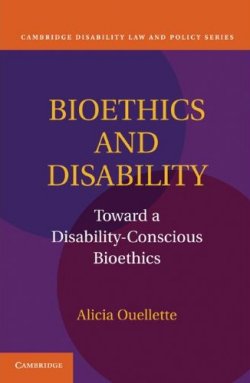Book Review
Bioethics And Disability:
Toward a Disability-conscious Bioethics
By Alicia Ouellette
Cambridge University Press
ISBN:
978-0521110303
 The
author cogently argues that bioethics would serve people better
if there is greater regard for disability issues. We ought to
listen to the voices of people with disabilities, unearth
prejudice and pursue inclusive justice.
The
author cogently argues that bioethics would serve people better
if there is greater regard for disability issues. We ought to
listen to the voices of people with disabilities, unearth
prejudice and pursue inclusive justice.
She presents the case of a man rendered ventilator-dependent following an accident. He won a court order to have his ventilator switched off and, while bioethicists argued that the choice was entirely his to make, disability experts actively supported him to improve his life and so he chose not to switch off the ventilator after all.
She is critical of the views of Peter Singer who believes that disabled infants ought to be killed at the request of the parents. Indeed, Singer has also said that healthy infants may be killed under some circumstances as they are not yet persons. Singer is at least consistent with his position. She mistakenly writes that Singer's position has little support outside of academia.
So far so good. And yet her own liberal "rights" based ethics is problematic. When discussing the Terri Schiavo case, a case involving the deliberate withdrawl of food and fluids from a disabled woman who was not dying, she is critical of those who campaigned to keep her alive. She mistakenly believes that they were promoting an unhealthy form of ethical vitalism when, in fact, their actions were solidly based on the inviolability of life principle.
She also looks at the problem of disability experts promoting the protection of people with disabilities as a group when community interests might conflict with the choices disabled persons might make. The problem is surely with the underlying ethic. It is always objectively wrong to intentionally bring about the death of an innocent human being. The author unfortunately appears not to believe in objective moral principles.
REVIEWED BY DR PRAVIN THEVATHASAN
